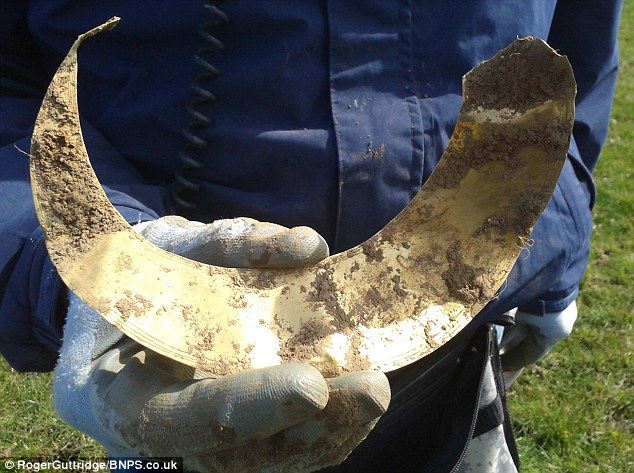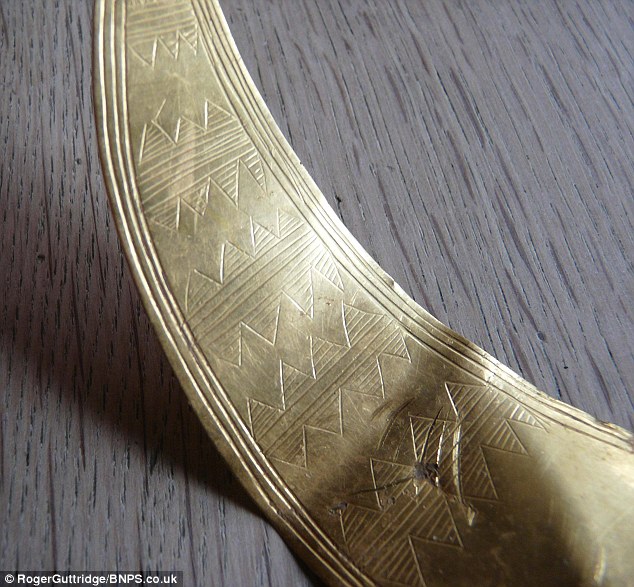A metal detectorist has found a Bronze Age gold tribal necklace worth £20,000 in a field full of grazing cows in Dorset.
David Spohr, an engineer, had just about given up on his search in the field near the market town of Blandford Forum in the Tarrant Valley and head back for his lunch when his metal detector sounded.
At first he thought it was nothing more than a rusty old sardine tin but after wiping off the mud was shocked to find it was a solid gold amulet.
The unremarkable lump was revealed to be a gold lunula, a crescent-shaped necklace dating back to the Bronze Age and engraved with an ancient pattern.
Lunulas - meaning 'little moon' in Latin due to their shape - were rigid necklaces worn by ancient tribal leaders as a symbol of power and authority.
Findings of lunulas are rare in Britain. Research suggests that more than 80 of the 100 lunulas found in the past were in Ireland and several others on the coast of mainland Europe.
Spohr said he may use the money to go on holiday.
Engineer finds ancient solid gold tribal necklace worth £20,000 in farmer's field full of grazing cows
Treasure hunter David Spohr had given up search in Tarrant Valley, Dorset
But just as he was about to leave for lunch, his metal detector sounded
He had struck upon a 3,500-year-old tribal gold necklace worth £20,000
Discovered a Lunula - meaning 'little moon' in Latin due to their shape
The rigid necklaces worn by ancient tribal leaders as symbol of power
By Amanda Williams
20 May 2014
Daily Mailhttp://forums.canadiancontent.net/n...-000-farmers-field-grazing-cows.html#comments
Daily Mailhttp://forums.canadiancontent.net/n...-000-farmers-field-grazing-cows.html#comments
An engineer has discovered a 3,500-year-old tribal gold necklace worth £20,000 in a field full of grazing cows.
Part-time treasure hunter David Spohr had given up on his search in the Tarrant Valley, Dorset, and was on his way for lunch after a fruitless morning when his metal detector suddenly sounded.
At first glance, he said the dull metal object he unearthed looked to be nothing more precious than a rusty old sardine tin.

Engineer David Spohr has discovered a 3,500-year-old tribal gold necklace worth £20,000 in a field full of grazing cows

At first glance he said the dull metal object he unearthed looked to be nothing more precious than a rusty old sardine tin. Little did he know that it was a solid gold Lunula dating back to the Bronze Age
But after wiping off the mud he was shocked to find the object was a solid gold amulet.
The unremarkable lump was revealed to be a gold lunula, a crescent-shaped necklace dating back to the Bronze Age and engraved with an ancient pattern.
Lunulas - meaning 'little moon' in Latin due to their shape - were rigid necklaces worn by ancient tribal leaders as a symbol of power and authority.
The lunula unearthed by Mr Spohr weighs 71.5 grams, and is one of only a handful found in mainland Britain - and the first to be discovered using a metal detector.
Only three others have ever been found in Britain, the last of which was dug up in Wales in 1869.
Mr Spohr, 55, a precision engineer, has now discovered the necklace could be worth as much as £20,000.
The find would have been worth even more but it is thought to have been damaged by a farmer's plough.
Mr Spohr, from Poole, Dorset, said: 'I headed across the field to get my sandwiches and kept the detector on as I walked.

Lunulas - meaning 'little moon' in Latin due to their shape - were rigid necklaces worn by ancient tribal leaders as a symbol of power and authority

The lunula unearthed by Mr Spohr weighs 71.5 grams, and is one of only a handful found in mainland Britain - and the first to be discovered using a metal detector

Mr Spohr, 55, a precision engineer, has now discovered the necklace could be worth as much as £20,000. The find would have been worth even more but it is thought to have been damaged by a farmer's plough
'Halfway across I got the signal. I dug very carefully and was quite amazed when I got it out.
'I could see it was yellow and so shiny. I also saw some engraved edges and I realised it was something special.
'We do find a lot of rubbish and you never think you're going to find a lump of gold.
'I have found some good things in the past but this was the find of a lifetime. You dream of finding something as significant as this. It was unbelievable.'
A treasure inquest will now be held and the value will be split between Mr Spohr and the owner of the field near Blandford.
It is then expected to go on show in a museum.
Mr Spohr, who has been treasure hunting for six years, added: 'It is being examined at the moment and will then go to the coroner who will declare it treasure.
'Its value is decided by a team of experts and typically you split it 50/50 with the landowner.
'I've heard everything from £2,000 to £20,000 but I'm not getting too excited until I get the letter.
'I'll probably use the money to go on holiday.'

A treasure inquest will now be held and the value will be split between Mr Spohr - who has been treasure hunting for six years - and the owner of the field near Blandford Forum

Part time treasure hunter David Spohr had given up on his search in the Tarrant Valley, Dorset, and was on his way for lunch after a fruitless morning when his metal detector suddenly sounded
It is thought the lunula is between 2,500 and 4,500 years old but it is hoped the British Museum, who are currently examining it, will be able to narrow down the date.
Members of the Stour Valley Search and Recovery Club, of which Mr Spohr is a member, say the lunula is the most exciting find in their 30-year history.
Research by club members suggests that more than 80 of the 100 lunulas found in the past were in Ireland and several others on the coast of mainland Europe.
In mainland Britain, one was found in Wales in 1869 and three on the coast of Cornwall.
David Eagles, the club chairman, said: 'It is a very exciting find - a once in a lifetime discovery.
'Our club has been going 30 years and I can't think of a more significant find.
'We have been searching those fields for 25 years and they still continue to surprise us.
'David called me over when he made his discovery and it was very exciting to see the necklace come out of the ground.
'It is a wonder that it was still in tact after all these years.'
AFTER THE GOLD RUSH: WHAT HAPPENS ONCE YOU FIND TREASURE ?
If you find any ancient objects whether they are made of precious metal or other metals or clay it is called ‘treasure trove’ and is the property of the Crown.
Anyone who finds objects which might be treasure trove must report it to the local police or museum, the local authority archaeologist.
Goods found in the sea or on the seashore could be from a ship and are known technically as ‘wreck’. All wreck must be reported to The Receiver of Wreck, The Maritime and Coastguard Agency.
Treasure discovered on land is governed by The Treasure Act.
If you find treasure, under the law you are obliged to report it to your local police station within 14 days. They will pass it on to the coroner who will decide whether it is defined as treasure.
If a museum wants to acquire the find, it is likely you will receive the market value price. However, if no one wishes to purchase it, the finder may be entitled to keep it.